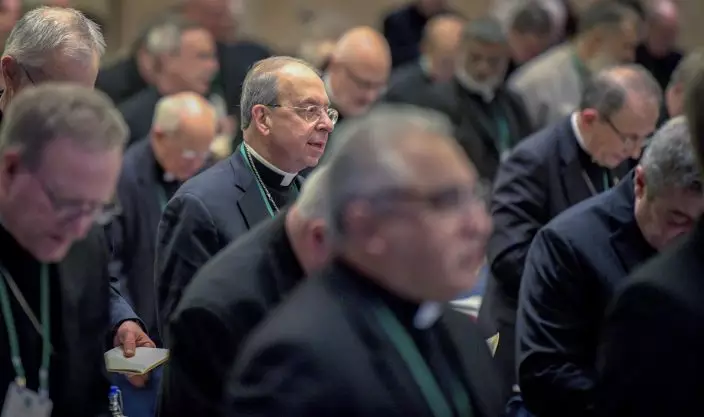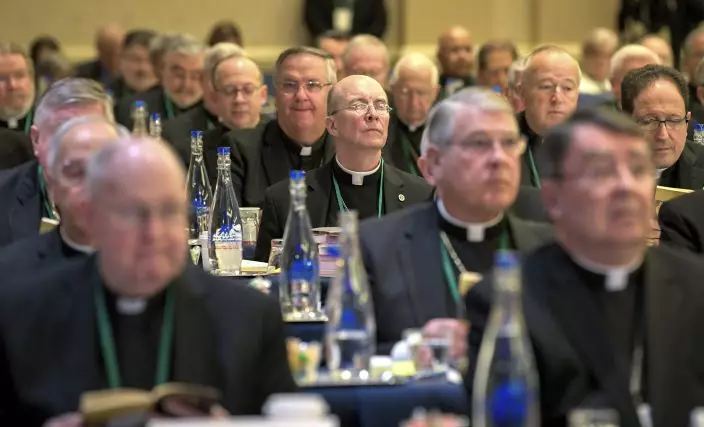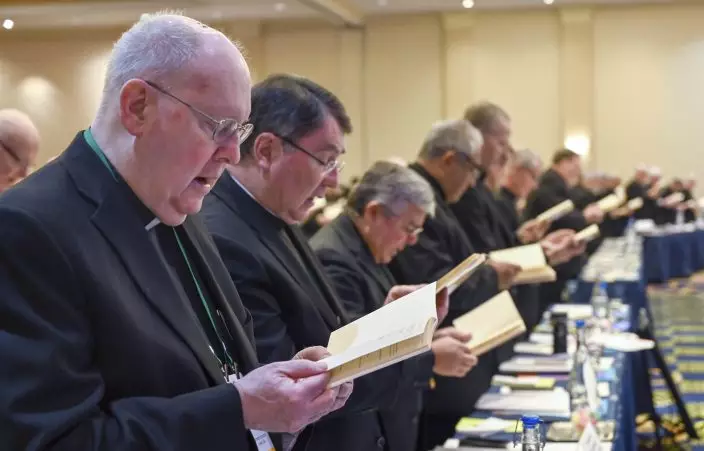US Catholic bishops received a challenging to-do list Monday as they opened their national assembly — notably to support immigrants and refugees, extend the campaign to curtail clergy sex abuse and work harder to combat gun violence. They also were urged by Pope Francis' envoy to be more vigorous in promoting sometimes-divisive segments of the pope's agenda.
"The pope has emphasized certain themes: Mercy, closeness to the people... a spirit of hospitality toward migrants, and dialogue with those of other cultures and religions," Archbishop Christophe Pierre, the papal nuncio, told the bishops as they opened a three-day meeting. "Do you believe these are gradually becoming part of the mindset of your clergy and your people?"
Pierre said the bishops should find tangible ways of showing they supported the pope's merciful message and flexible doctrine, which includes an emphasis on protecting the environment. The remarks came just weeks after Francis acknowledged he was under attack by some conservative Americans and spoke openly about the risk of "schism."

William Lori, Archbishop of Baltimore, stands during the opening prayer of the United States Conference of Catholic Bishops Fall General Assembly at the Baltimore Marriott Waterfront Monday, Nov. 11, 2019. (Jerry JacksonThe Baltimore Sun via AP)
The meeting's opening session also featured the last presidential address from Cardinal Daniel DiNardo, archbishop of Galveston-Houston, who is ending his three-year term as head of the U.S. Conference of Catholic Bishops.
The current vice president, Archbishop José Gómez of Los Angeles, is expected to be elected Tuesday to succeed DiNardo. An immigrant from Mexico, and an outspoken advocate for a welcoming immigration policy, Gómez would be the first Hispanic to head the USCCB.
Much of DiNardo's presidency was dominated by the church's long-running crisis arising from the sexual abuse of minors committed by Catholic priests. Last year, for example, former Cardinal Theodore McCarrick was ousted from the priesthood due to sexual misconduct allegations and a Pennsylvania grand jury report asserted that about 300 priests had abused at least 1,000 children in the state over seven decades.

Bishops are seated during the opening moments of the United States Conference of Catholic Bishops Fall General Assembly at the Baltimore Marriott Waterfront Monday, Nov. 11, 2019. (Jerry JacksonThe Baltimore Sun via AP)
DiNardo himself was faulted for his handling of abuse cases. At one point, Texas investigators raided DiNardo's chancery in search of documents about a priest retained in ministry despite allegations he molested a minor.
DiNardo, in his speech, said his life was "forever changed" by his meetings with survivors of abuse.
"When too many within the church sought to keep them in the darkness, they refused to be relegated to the shadows," he said, crediting the survivors with motivating the bishops to expand victim-support programs and adopt numerous abuse-prevention measures. These include an in-the-works reporting system — approved by the bishops in June — for handling misconduct allegations involving the bishops themselves.

Monsignor Michael P. Morgan sings during an opening hymn at the start of the United States Conference of Catholic Bishops Fall General Assembly at the Baltimore Marriott Waterfront Monday, Nov. 11, 2019. (Jerry JacksonThe Baltimore Sun via AP)
"We have learned how we must strive for justice for the victims of sexual abuse," DiNardo said. "The measures we approved last June are a beginning of this renewed striving, but they are only a beginning — more needs to and will be done."
At a news conference after his address, DiNardo reflected on his presidency.
"I'd be not telling the truth if I told you that it wasn't a rough ride because it was," he said. "But I was always hopeful, and I thought that we managed to do the rough ride."
Asked about the papal nuncio's remarks, DiNardo played down concern about anti-Francis dissent among the bishops.
Bishop Robert Reed, auxiliary bishop of Boston, acknowledged there was some friction, but cast it in a positive light.
"Certainly, there is an urgency of many issues in the church and in our life as Catholics at this particular moment," said Reed. "So, that urgency creates a dialogue, which sometimes creates tension, but that's a good, positive thing to have that conversation."
One of the topics on Monday's agenda — gun violence — resonated with several bishops with urban dioceses who rose to speak of the toll it has taken on their communities.
"Our children are afraid to go to school," said Cardinal Blase Cupich, the archbishop of Chicago. "We need to realize that the gun lobby advocating against any change are really motivated by profit."
Bishop Frank Dewane of Venice, Florida, presented a report on gun violence compiled by the USCCB's Committee on Domestic Justice and Human Development. He urged the bishops to escalate pressure on politicians to adopt a range of "common-sense restrictions" to curb the violence, including a ban on large-capacity magazines, closing loopholes on background checks, licensing handguns and approving "red flag" laws that facilitate the seizure of guns possessed by people deemed a danger to themselves or others.
Dewane also suggested bishops consider changing the church's financial investment guidelines, used in the investment and management of billions of dollars in church assets, to ban investment in manufacturers of assault weapons, large capacity magazines and handguns.
"There are no easy answers as to how to end this epidemic," Dewane said. "Even in the midst of division in our politics, we have opportunity to promote thoughtful legislation at state and federal level that will save lives."
Another topic weighing on the bishops is how to bring back to church the large numbers of young Catholics who are leaving the faith. Bishop Robert Barron, the auxiliary bishop of Los Angeles, suggested placing more emphasis on the church's social justice campaigns, vis-à-vis emphasis on its teachings about sexuality.










